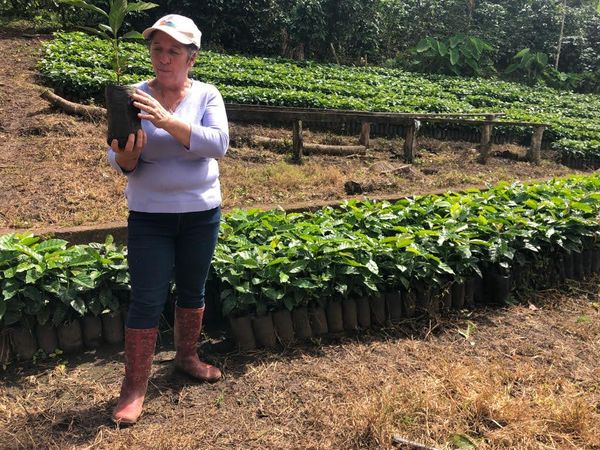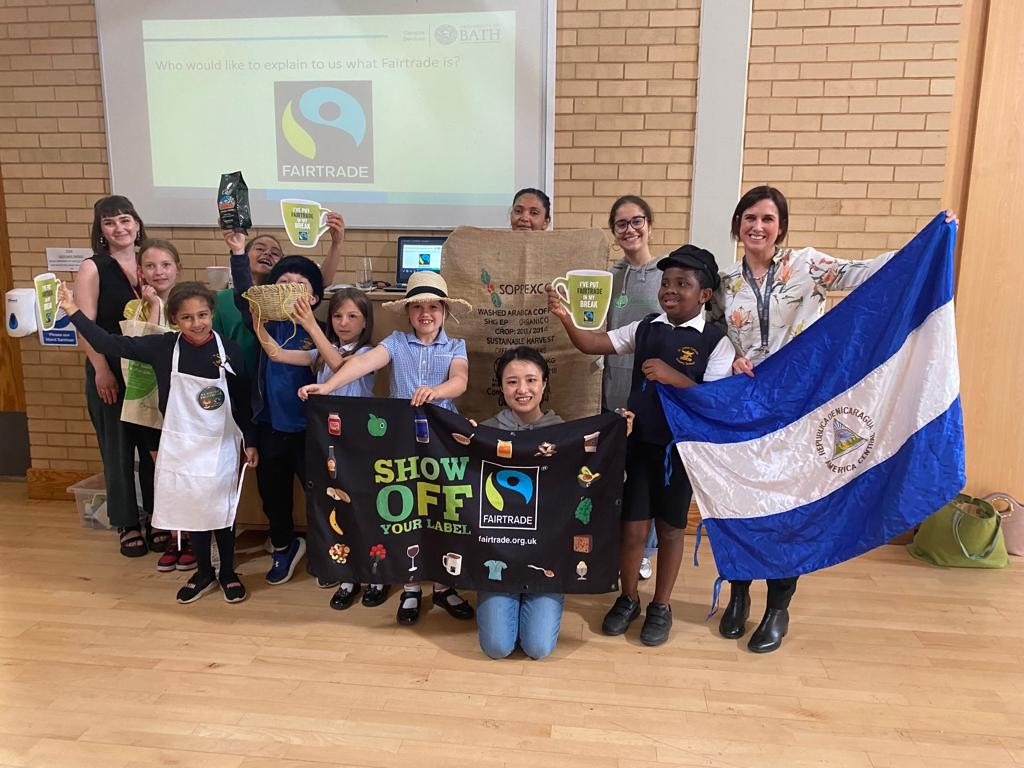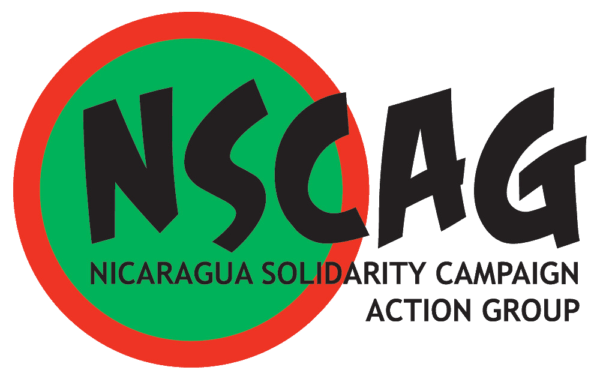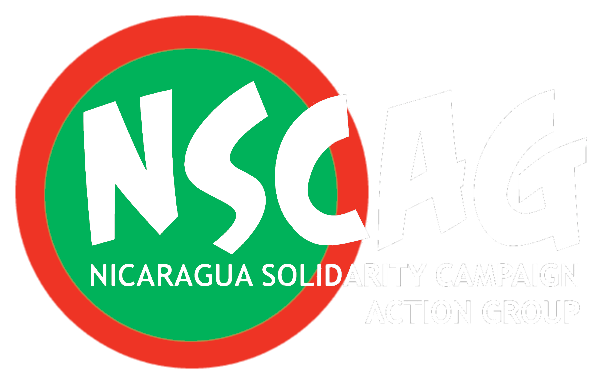Nicaragua Solidarity Campaign Action Group
11 May 2024
There’s no climate justice without social & economic justice

Fairtrade is both the bridge and the vehicle that helps to transform the wellbeing of the families of small-scale producers. There cannot be climate justice without justice in the market for our products. ‘ Fatima Ismael, general manager, Union of Co-operatives, SOPPEXCCA.
Nicaraguan Fairtrade coffee farmer, Flora Montenegro, has been in Bristol from 29 April – 12 May, visiting schools, colleges and businesses talking about life in the highlands of Nicaragua, the impact of the climate crisis, and the benefits of Fairtrade to her family, community and cooperative.

Flora lives with her three generational family in northern Nicaragua where she grows organic Fairtrade coffee for export and fruit and vegetables for family consumption and to sell locally.
She also keeps bees (mostly for the pollination of the coffee flowers) and chickens and part of her land is forested.
Flora has multiple roles as a family member, as a farmer and entrepreneur, as a member of a cooperative and community activist. Flora and her husband, who has his own piece of land, are members of a 30 strong co-operative called Isabelia half of whom are women. As well as an Executive Committee the co-operative has commissions responsible for education/training, credit, and gender.
What has being a member of SOPPEXCCA meant to Flora?
The co-operative Isabelia in one of 16 co-operative that make up the Union of Co-operatives SOPPEXCCA.
When Flora got married, her husband was a member of SOPPEXCCA: he owned some land and was the breadwinner, Flora did not even have any money of her own.
However, this gradually changed when Flora too became involved with SOPPEXCCA, an organisation renown for its commitment to gender equality.
She began by attending SOPPEXCCA gender trainings and little by little acquired first one field then built up to her current 14 hectares.
Of particular note was the year that she won the SOPPEXCCA tasa de excelencia, (cup of excellence) that brought recognition of her work, and motivated her to improve her own farm and to become more involved in the Isabelia co-operative. She attributes all of this to the leadership and inspiration of Fatima Ismael, the founder and general manager of SOPPEXCCA.
Why Fairtrade matters, moving from subsistence to sustainability
Organic Fairtrade coffee grown by women members of SOPPEXCCA is sold in the US by Peet’s coffee chain under a brand name ‘Las Hermanas’ (The Sisters).
Under this trading arrangement the women receive three premiums: one because the coffee is organic, the second because they are registered under under the Fairtrade mark, and the third because the coffee grown by women.
Flora explainedthat ‘without Fairtrade and organic premiums it would be impossible to even cover production costs.’
How does Flora invest these premiums?
The priority for Flora is to use the funds to combat climate related diseases, invest in her own plant nursery to able her to replace non productive bushes thereby improving the quality of the coffee, and to ensure that the labourers she contracts to maintain the coffee bushes and pick the coffee are fairly paid.
How has the climate crisis impacted Flora and other SOPPEXCCA producers?
Flora explained that main problem over the past two years has been lack of rain. This means that coffee flowers wither and fall off, coffee cherries don’t mature properly, and there is a greater prevalence of difficult to control diseases not seen in the area before.
Yields have dropped significantly which in turn impacts income.
All these factors also have a psychological impact in terms of extra work and levels of uncertainty and anxiety.
What measures do Flora and other SOPPEXCCA producers take to combat the impact of climate crisis and to increase biodiversity?
Diversification of crops
In addition to organic coffee Flora and her family grow a wide variety of fruit and vegetables such as maize, dried and green beans, beetroot, squash, cabbages, and oranges. They grow these crops for their own consumption and to sell locally and in Managua. All these crops are organic so contribute to biodiversity.
Using composted fertilisers supplies by SOPPEXCCA. As far as possible everything is circular based on principle of returning to the earth what you take from it.
Planting native trees between rows of coffee conserves moisture in the soil during dry periods and prevents run off in heavy rains. Flora also has 1 ½ hectares of native hardwood forest.
What other challenges do producers face?
An additional challenge, as also highlighted by UK farmers, is rising costs of production. This includes the cost of all inputs, labour costs, transport, biosecurity measures, as well as all the extra measures related to mitigating/adapting to climate crisis and improving biodiversity.
Exhaustion was another challenge that Flora mentioned: working long hours 9am – 9pm on most days and even most of Sundays when there are still animals that to be fed and other tasks that cant wait.
Flora has multiple roles as a family member, as a farmer and entrepreneur, as a member of a co-operative, and as a community activist supporting brigadistas
from the local health clinic on health surveys and vaccination days.
What are Flora’s hopes and plans for the future?
As with UK farmers Flora and other SOPPEXCCA members are constantly looking into ways of diversifying to avoid over dependence on a particular crop or source of income. SOPPEXCCA has an ecotourism programme enabling visitors to stay homes of SOPPEXCCA members, Flora would like to convert a room in the family’s house to create a space so that her famiily could be part of this programme.
Encouraging the involvement of the next generation. (This is a key SOPPEXCCA objective). Flora very optimistic about her eight year old granddaughter who is interested in everything related to the farming and constantly follows Flora around.
‘ Fairtrade is both the bridge and the vehicle that helps to transform the wellbeing of the families of small-scale producers. There cannot be climate justice without justice in the market for our products.‘ Fatima Ismael, general manager SOPPEXCCA
Further information on Fairtrade: https://www.fairtrade.org.uk/

